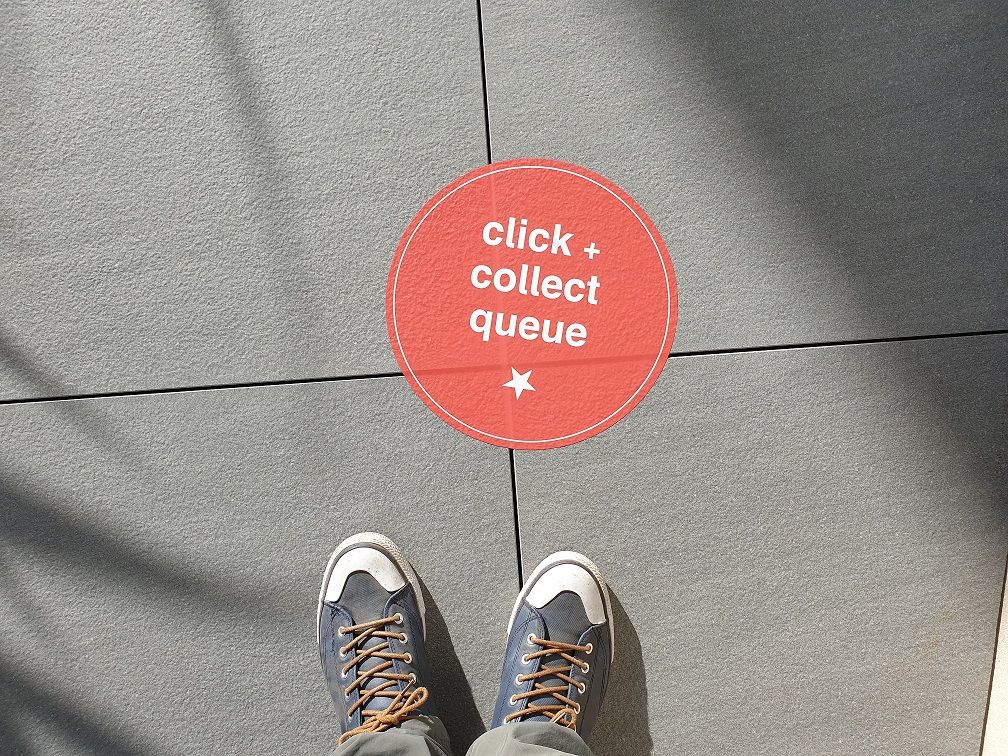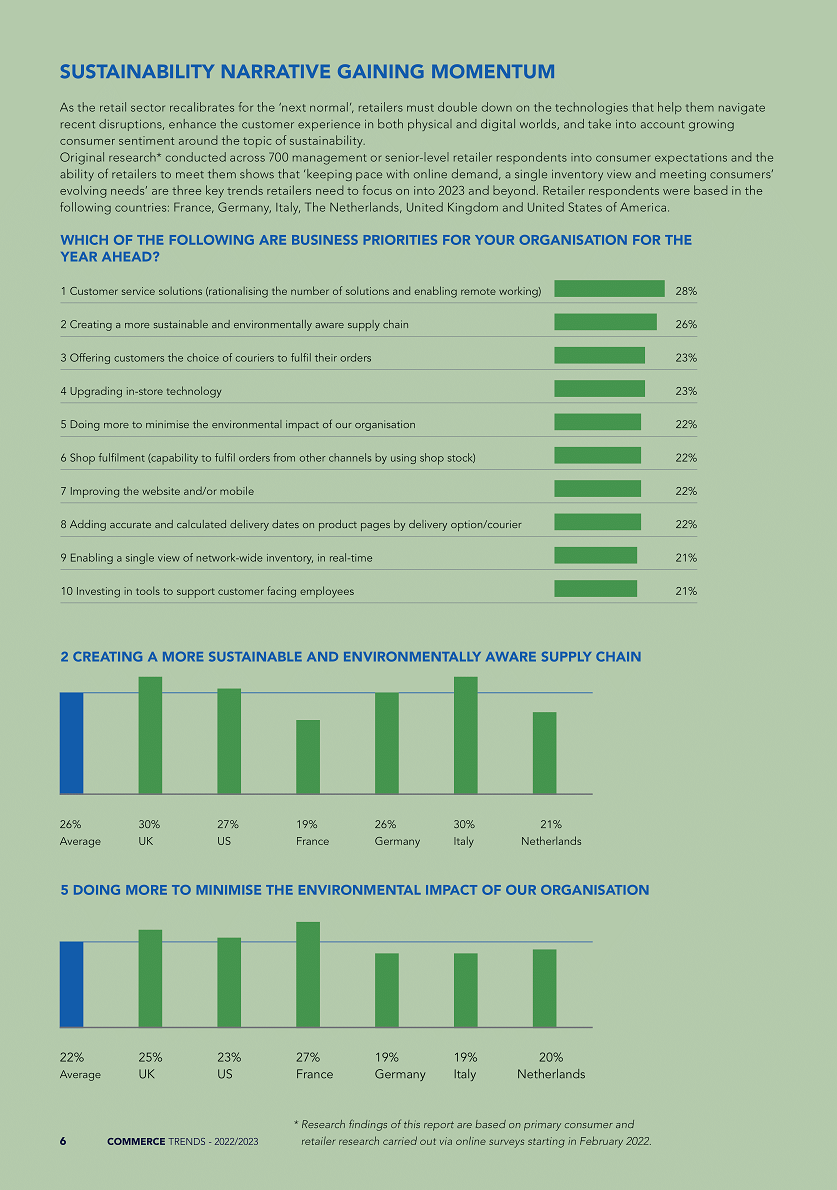Customers want more choice, more convenience and more speed. At the same time, companies are under increasing pressure to deliver profits while operating more sustainably. How can we reconcile this? Henri Seroux, Senior Vice President EMEA at Manhattan Associates, addresses these current challenges. “It’s up to us to create the right conditions so that retailers can operate quickly when they need to and sustainably where they can.”
These are exciting times to work within a company like Manhattan Associates. Retailers, wholesalers and other companies are increasingly calling on the supplier of omnichannel and supply chain technology.
Henri Seroux notices it in his conversations with the people responsible for digitalisation and supply chain in these companies. All eyes in the company, including those of board members and shareholders, are on them. “More than ever, they influence the strategic decisions within the company. For they must provide answers to the crucial issues of our time. Within Manhattan Associates, the realisation is growing that we can make a substantial contribution to this. But, to make the right decisions innovative, flexible and scalable technology is needed,” says the Senior Vice President EMEA of Manhattan Associates.
“Customers no longer have to wait years, but at most a few months, before an idea is turned into functionality.”
Sustainability
The issue is bigger and more pressing than ever. The heat of inflation, ignited by the war in Ukraine, is raging throughout Europe. Prices, especially for energy and food, have risen sharply in a few months. Consumers have become more cautious, are watching their spending habits more closely than before and are holding their purse strings more tightly. Retailers notice this at the cash register.
At the same time, the pressure on businesses to operate more sustainably is growing. Consumers are asking more and more questions in shops. Not only about the footprint of products, but also about their origin and the raw materials used.
“Everyone is not only a consumer, but also a citizen of this planet and, increasingly, an employee of a company that is actively working on sustainability. These people want their work to have meaning and do good for society and the planet, not just a customer’s P&L. It is interesting to see that this growing awareness is now also influencing their behaviour as consumers.”
We are seeing another interesting development in Europe this year. According to Seroux, this is a temporary phenomenon that has little to do with worrying economic developments. “While the rapid explosion in ecommerce accelerated by the pandemic is beginning to plateau, this new normal is still far in excess of pre-pandemic levels. It is no wonder this levelling-out is occurring given not so long ago online was the only channel available. Now that the situation has normalised and shops are open again, this was a natural progression.”
Seroux has no doubt that growth in ecommerce will continue to creep upwards in the long run. “The desire to receive goods even faster and with more convenience is only increasing. I can assure you that nobody expects anything different in ecommerce. It is not for nothing that, in addition to retailers, more and more brands are choosing to sell directly to consumers via the Internet.”

The green paradox
As mentioned earlier, besides speed, choice and convenience, consumers are also increasingly focused on the topic of sustainability. And, while that, might appear to be a contradiction in terms, retailers need to consider how to deliver more services and at the same time as keeping both costs and CO2 emissions in check.
“There are moments in our lives as consumers when we can lose sight of the bigger picture. A time when we momentarily forget the long-term health of our planet and opt for that combination of discount and the quickest delivery time,” says Seroux. “It’s up to us to create the right conditions so that retailers can offer speed when necessary as well as more sustainable options too.”
There are several ways Manhattan Associates can help companies with their sustainability goals. Firstly, by investing heavily in innovation. Because Manhattan has completely switched to cloud-native software applications, innovations are available to all users more quickly. “They no longer have to wait years before an idea is converted into functionality”, says Seroux. “In addition, this is the moment to use the strength of our people. We have a large group of experts who deliver our customer projects. They can advise customers on how to create fewer transportation kilometres, higher load factors and more efficient return flows. We invest a lot, not only in the software but also in our people.”
“Retailers need a powerful engine that calculates the fastest, cheapest or most sustainable option in a split second.”
Smarter order streaming
Take a consumer who places an order online today and another in an hour’s time. Chances are that consumer will receive two shipments. “The vast majority of retailers are not able to merge those two orders. Because our solutions for order management, warehouse management and transportation management are fully integrated, we can offer retailers more options. Such as the ability to add items to an order later in the day, even if they are in a different warehouse. That all sounds simple, but it is anything but straightforward in a warehouse that processes tens of thousands of order lines every day.”
Traditional warehouses use a warehouse management system, with which they combine large numbers of orders into efficient waves. Once a wave is released for order picking, nothing can be changed. “With order streaming, we can work much more real-time. The moment we inject orders into the process, we can accurately match the cut-off time or delivery time agreed with the customer. We can hold the first, second and third orders and inject them into the order picking process together with the fourth order, so that they are handled simultaneously and end up in one box, thus reducing split shipments and the unnecessary carbon footprint of the extra miles travelled.”
“It’s an unwritten law that when there are hiccups in the chain, the pressure increases on the last link.”
Maximising more local stock
Another possibility is to offer multiple options and incentives so that retailers can steer the ordering behaviour of consumers. For example, rewarding them if they choose a longer delivery time or in-store pickup. “More and more retailers are using more local stock in the shops to deliver to consumers faster and more sustainably. What these retailers need is a powerful engine that, based on business rules, can calculate in real-time what the fastest, cheapest or most sustainable delivery option is: from the warehouse or from the shop.
“This depends on various criteria such as distance, delivery time and the costs of handling, transport and restocking. It may turn out that it is more efficient and more sustainable to ship the order from the supplier’s warehouse. All this has to be calculated in a split second, between the moment the consumer clicks on a product and the moment they press the buy button.”

The mustard seed affair
Another problem concerns hiccups in the supply of products due to numerous, smaller incidents in the supply chain, causing some products to appear temporarily unavailable. Seroux himself saw how reports of a shortage of mustard seed led to hoarding behaviour. “Many consumers stocked up on mustard and created the very problem they were afraid of,” laughs Seroux. “It is an unwritten law that when there are hiccups in the chain, the pressure increases on the last link. Considering that rumor of availability of such ‘rare and precious’ products at one store when there are empty shelves in others, can cause panic buying. Pressure to make incoming stock available for delivery causes challenges, but one unified warehouse and transportation management system, such as Manhattan Active® Supply Chain, can actually go a long way to alleviating such pressure points.”
As if these were not enough challenges, staff shortages are mounting. Both in the warehouses and the shops. “We see that employees are more loyal and less likely to switch to other employers if two conditions are met, in addition to competitive wages of course. The first condition is that the quality of management improves. Managers need to know who their employees are, what strengths they have and how best to use them. “In addition, we need to ensure that employees are given the right tools. They want applications that are as simple and intuitive as the apps on their smartphone. We responded to this trend by using gamification. People can follow and improve their own performance in a playful way. That may not help to solve all the problems in the labour market, but it does enable companies to distinguish themselves positively as employers.”
Accelerating towards unification
Over the past six years, Manhattan has invested no less than half a billion dollars in the development of a new generation of applications under the name Manhattan Active. Because these are cloud-native applications, a solid foundation has been laid for further innovation in the future. Innovation in the form of new functionality, but also in the form of new processes made possible by the far-reaching integration of the applications.
“We are now on the digital highway with all our solutions. That does not mean that we are slowing down. On the contrary, we have everything on board to accelerate into the future. Many companies have already started working with our solutions, but are only harnessing a fraction of the potential these solutions can offer when all bought to bear in conjunction with each other. Over the coming years we will continue to invest in innovation that not only benefits our customers and their end-consumers, but also benefits our planet too!”

Reacties 0